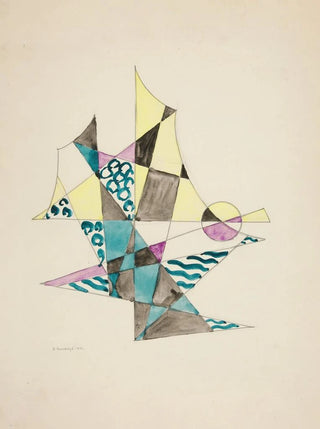Abstract Painting based on the sails I - David Kakabadze | Art print


View from behind

Frame (optional)
Art print Abstraction inspired by the sails I - David Kakabadze – Captivating introduction
In the fascinating universe of abstract art, the work "Abstraction inspired by the sails I" by David Kakabadze stands out for its depth and originality. This piece, emblematic of the early 20th century, embodies a quest for freedom and expression that still resonates today. Kakabadze, a major figure of the Georgian artistic movement, manages to capture the very essence of modernity through fluid shapes and vibrant colors. Contemplating this work, the viewer is transported to a world where imagination and reality meet, offering a visual experience that is both stimulating and soothing.
Style and uniqueness of the work
Kakabadze's work is characterized by a bold approach to abstraction. In "Abstraction inspired by the sails I," the forms intertwine with an almost airy lightness, evoking the movement of sails in the wind. The sinuous lines and delicate hues combine to create a visual dynamic that invites contemplation. The artist skillfully plays with contrasts, alternating between shadows and lights, to give life to a composition that seems both stable and in motion. This work is not just a visual representation; it is an invitation to feel, to immerse oneself in a universe where each color tells a story, and each shape evokes an emotion.
The artist and his influence
David Kakabadze, born in 1889, is often considered a pioneer of modern art in Georgia. His career was marked by a constant exploration of the boundaries between traditional and contemporary art. Influenced by movements such as cubism and fauvism, Kakabadze developed a unique style that is his own. His ability to incorporate Georgian cultural elements into a modern aesthetic allowed him to stand out on the international art scene. Through his work, he not only redefined artistic conventions but also inspired a new generation of artists to express themselves freely. Kakabadze's impact is still felt today, both in Georgia and abroad, where his

Matte finish

View from behind

Frame (optional)
Art print Abstraction inspired by the sails I - David Kakabadze – Captivating introduction
In the fascinating universe of abstract art, the work "Abstraction inspired by the sails I" by David Kakabadze stands out for its depth and originality. This piece, emblematic of the early 20th century, embodies a quest for freedom and expression that still resonates today. Kakabadze, a major figure of the Georgian artistic movement, manages to capture the very essence of modernity through fluid shapes and vibrant colors. Contemplating this work, the viewer is transported to a world where imagination and reality meet, offering a visual experience that is both stimulating and soothing.
Style and uniqueness of the work
Kakabadze's work is characterized by a bold approach to abstraction. In "Abstraction inspired by the sails I," the forms intertwine with an almost airy lightness, evoking the movement of sails in the wind. The sinuous lines and delicate hues combine to create a visual dynamic that invites contemplation. The artist skillfully plays with contrasts, alternating between shadows and lights, to give life to a composition that seems both stable and in motion. This work is not just a visual representation; it is an invitation to feel, to immerse oneself in a universe where each color tells a story, and each shape evokes an emotion.
The artist and his influence
David Kakabadze, born in 1889, is often considered a pioneer of modern art in Georgia. His career was marked by a constant exploration of the boundaries between traditional and contemporary art. Influenced by movements such as cubism and fauvism, Kakabadze developed a unique style that is his own. His ability to incorporate Georgian cultural elements into a modern aesthetic allowed him to stand out on the international art scene. Through his work, he not only redefined artistic conventions but also inspired a new generation of artists to express themselves freely. Kakabadze's impact is still felt today, both in Georgia and abroad, where his
12,34 €






